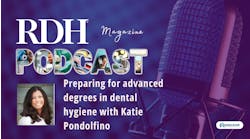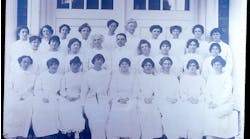2018 Heart to Hands Award: Hygienists use video to explain how they deliver oral health messages
With videos, three hygienists highlight how dental hygiene continues to shape their destiny
Editor's Note: Some of you may have arrived at this link due to a reference within the April 2018 issue of RDH magazine. If so, you are at the right place. The videos for the three award recipients are below. You may have read the article elsewhere, but please scroll down until you can see and play the videos. If you have stumbled across this article quite innocently, we hope you enjoy the article and videos.
By Mark Hartley
The “safe” environment in dental settings, oral health education in the hospital setting, and anecdotes about villagers in Uganda will receive some quality video time during the second annual Heart to Hands award this June.
In a ceremony during the American Dental Hygienists’ Association’s annual session, dental hygiene leaders will watch and salute the award-winning Heart to Hands videos submitted by Mandi Bauer, RDH, Dara McConnell, RDH, and Rachel Bellon-Roxas, RDH.
Bauer, a dental hygienist in Jonesboro, Ark., offered the most global view in her video, sharing how preventive care in Uganda struggles to overcome tribal traditions. Bellon-Roxas is a Canadian recipient of the award, and she explained in her video “the value of being proactive with dental care is a lot more valuable than being reactive.” The final recipient, McConnell, practices in Maryland, but on a monthly basis she dedicates time to providing care to underprivileged children in six Maryland counties. The trio described their visions in videos that were approximately two minutes long.
Three dental hygienists were similarly applauded in the inaugural Heart to Hands Award ceremony at the Jacksonville, Fla., ADHA meeting in 2017. The three 2017 recipients were Mary Jensen RDH, MS, of Winfield, Ill, Jaci Klepadlo, RDH, of Mays Landing, N.J.; and Amanda Madronic of Stittsville, Ontario, Canada. The Heart to Hands Award is presented by Philips and RDH magazine.
McConnell started her video with a description of a sports injury that her brother endured during a rough game of hide-and-seek, and he would suffer an injury to tooth No. 8 twice more during his youth—during a soccer game and while jumping on a trampoline.
But it was his first visit to repair the tooth that captured McConnell’s interest in dentistry. “While we were there, the dentist asked if I wanted to come back and watch,” said McConnell, who is a Maryland resident. “While the dentist treated my brother, I was inspired by the calm he created in what is usually a stressful environment.”
Bellon-Roxas started her short video by explaining how she reaches out to patients in her local community hospital in Brampton, Ontario. She stressed, “Dental care is usually one of the least areas of focus for these clients but also can be one of the most impactful since it can affect your diet, speech, and recovery time.”
Bauer’s introduction in her video started with a powerful definition of community. The Jonesboro, Ark., resident’s first words were, “To most people, community means the city they live in, the neighborhood they’re located. But to me, it looks a little different. The definition of community is a feeling of fellowship among a group of people who share interests, passions, and goals. It doesn’t always mean the same as it would in my community.”
Her statement implied there’s a significant difference between Arkansas and the Ugandan villages of Mpigi and Zirobwe.
The Heart to Hands Award ceremony
The Heart to Hands Award ceremony during the annual session at the American Dental Hygienists’ Association will occur Friday, June 22, at the Hilton Columbus (Ohio) downtown hotel. Please consider watching the Heart to Hands award-winning videos at the online version of this article at RDHmag.com.
Preparing Maama kits: Mandi Bauer, RDH
Bauer earned her dental hygiene degree from the University of Arkansas at Little Rock. While in school, Bauer started traveling annually to Uganda while a senior in high school. She has visited the African country six times, including twice after college graduation.
“I have a very close family friend whose family lived in Uganda for several years,” she told RDH after submitting her video. “This opened the door for in-country connections and opportunities to serve in areas that probably would not have been possible otherwise. I consider the encounters I have made in Uganda to be lifelong friends, despite the thousands of miles that separate us.
“Uganda is considered to be the Pearl of Africa and for great reason. Not only is the landscape and geography stunning, but the Ugandans are truly some of the most beautiful and hospitable people I have ever had the pleasure of knowing.”
“The simple, yet vital, kit gives these beautiful women such a peace of mind before and during childbirth,” Bauer said. “This setting presents the perfect opportunity to review oral hygiene for not only the mother, but the child as well. These women are incredible moms that are starving for information on how to better care for their children. I quickly realized that dental education and access to care is nothing to take for granted!”
She said the young women of Uganda are her favorite patients, but added that challenges often lie in countering “misconceptions” about oral health. One tradition, for example, calls for the extraction of baby teeth, since they are “proof of evil spirits.”
‘To most people, community means the city they live in, the neighborhood they’re located. But to me, it looks a little different.’
During her video, Bauer states, “Providing these women with truth is something that not only affects and improves their lives, but also the lives of fellow village members and their children. This is a great way to remind these women of their value and their importance.”
The second opportunity occurred at a school for the deaf in Uganda. Her American neighbors raised the funds to install a well at the school, so the children would not have to walk several miles for water. Since they were deaf, they often did not hear the horns of cars and motorcycles on the road, suffering from injuries during collisions. Bauer took advantage of her visits to the school to distribute toothbrushes and toothpaste, as well as provide basic oral hygiene instructions. “Those smiles, the pure elation, and the radiating joy from those moments is forever etched in my memory,” she said.
Educating a local community: Rachel Bellon-Roxas, RDH
Bellon-Roxas stated that dental hygienists work in a variety of settings and work interprofessionally. Improving access to information and care in a community health setting can help support those in need, as well as reduce the major costs that can come with treating oral diseases by bringing awareness that oral health should not be neglected until symptoms arise.
Bellon-Roxas, a 13-year veteran of dental hygiene, volunteers her time to spread the word of good oral health to the city of Brampton.
She said, “After working in general practice for over 13 years, I decided it would be a great opportunity to do something different out of my comfort zone, and give back to my community, especially during National Dental Hygienists Week (April 7-13 in Canada this year). Since then, it has prompted me to revisit these locations several times last year.”
Besides hospitals, Bellon-Roxas visited schools and early childhood education centers. Her mission is to give back to the diverse community in which she grew up.
“I focus on those who would benefit from more dental knowledge and are at high risk for dental diseases, such as those with medical conditions, required health-care providers, seniors, young children, and parents of young children,” she said.
In the hospital setting, she sets up a “dental health promotion” table a few times a year at the Brampton Civic Hospital. “This allows the in-patient, out-patient, and health professionals to visit and discuss oral health concerns and learn more of how important oral care is for their overall health.”
“I contacted several dental companies to help support my outreach,” she said. “Providing information and samples of pastes and rinses that can address the different needs of the community. Xerostomia was a popular topic as many patients were taking numerous medications especially those with diabetes. Everyone likes free information and samples. This approach was a good start for visitors to come by for open discussions to help improve their quality of life.”
She added, “At the early childhood learning centers, I was able to connect with parents on diet and early hygiene care practices to help give their child a good start on oral health. Giving back any way I could was very rewarding as I once visited the center myself for support and resources as a new parent.” In school settings, Bellon-Roxas has provided education and dental supplies to more than 400 children in community schools. She said, “Students bring all sorts of sugary snacks and drinks to school. Helping them choose the healthier options is a great way to reduce their risk of cavities.”
Bellon-Roxas completed her dental hygiene diploma in 2004 at George Brown College in downtown Toronto. Her goal is to continue her personal outreach efforts in the Brampton area. “I help them recognize the role of the dental hygiene profession and emphasize the importance of how taking care of their mouth, teeth, and gums can positively impact their overall health,” she said. “I love providing direct dental hygiene care to my clients and also being involved in my community. I plan to continue to make dental hygiene care more accessible.”
Safe in my hands: Dara McConnell, RDH
As stated earlier, McConnell strives to provide the same “safe environment” that she witnessed at her brother’s dentist. Her brother, by the way, grew up to be a mechanical engineer who is based in Pennsylvania.
But the attitude of her brother’s doctor follows her during her journeys through the central Maryland countryside, when she is aboard the Smiles Mobile. She became involved with the mobile dental clinic after volunteering when another hygienist was unable to participate. She now volunteers approximately once a month.
“This clinic goes around to elementary schools to serve underprivileged children,” she said. “While there, I strive to create that warm and comfortable environment that was created for my brother and me when we were children.”
McConnell, who graduated from the Pennsylvania College of Technology in 2016, also practices with Dr. Patrick Gochar at the Family and Cosmetic Dentistry in Fulton, Md.
The focus of her video submitted to Heart to Hands judges was, however, a testimonial on striving to make patients feel at ease during appointments, pediatric patients in particular.
In an interview with RDH magazine after being named a recipient of the award, she elaborated:
“When watching Dr. James Kearns treat my brother, I specifically remember sensing the happy and upbeat energy in the operatory room created by the health-care providers. I associated that excited and positive feeling to the dental office ever since that experience. Children may not always remember what you say or do, but they will remember how you make them feel.
“Having an upbeat and positive energy that fills the treatment room is important for starting the appointment off right with each child and associating the dental office as a happy, or safe, environment. Taking the time to explain each step of the treatment process in terms the children will understand, showing each instrument that will be used, and allowing children to touch tools that are appropriate for them to touch also enable children to feel involved and more comfortable with each object being used for treatment.
“Some children may be innately more anxious than others. Being flexible and allowing yourself to alter the treatment plan by prioritizing the most important aspect of each visit and slowly building on treatment visit after visit can be more important than forcing the child to take on more than he or she can handle at one appointment. As all hygienists understand, empathy and patience is needed with every child we treat.”










